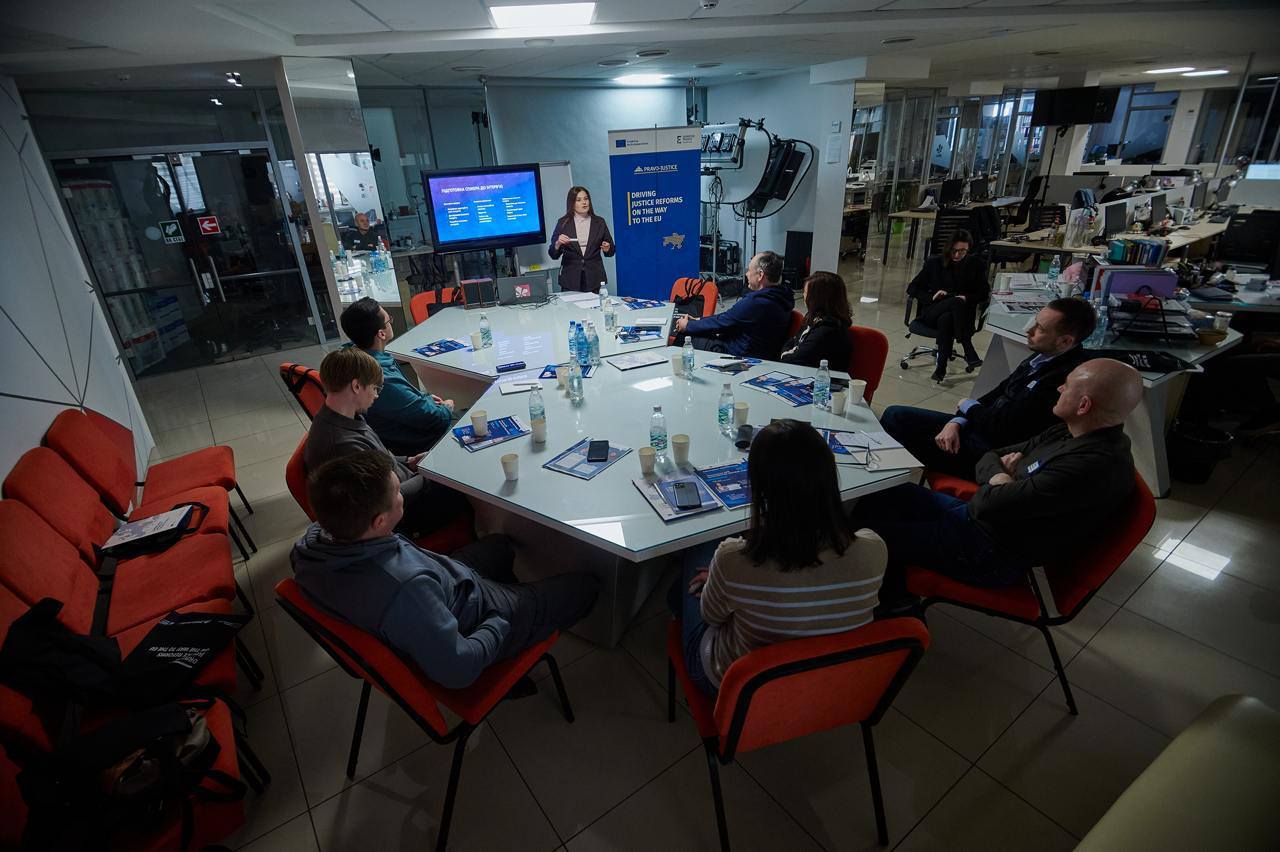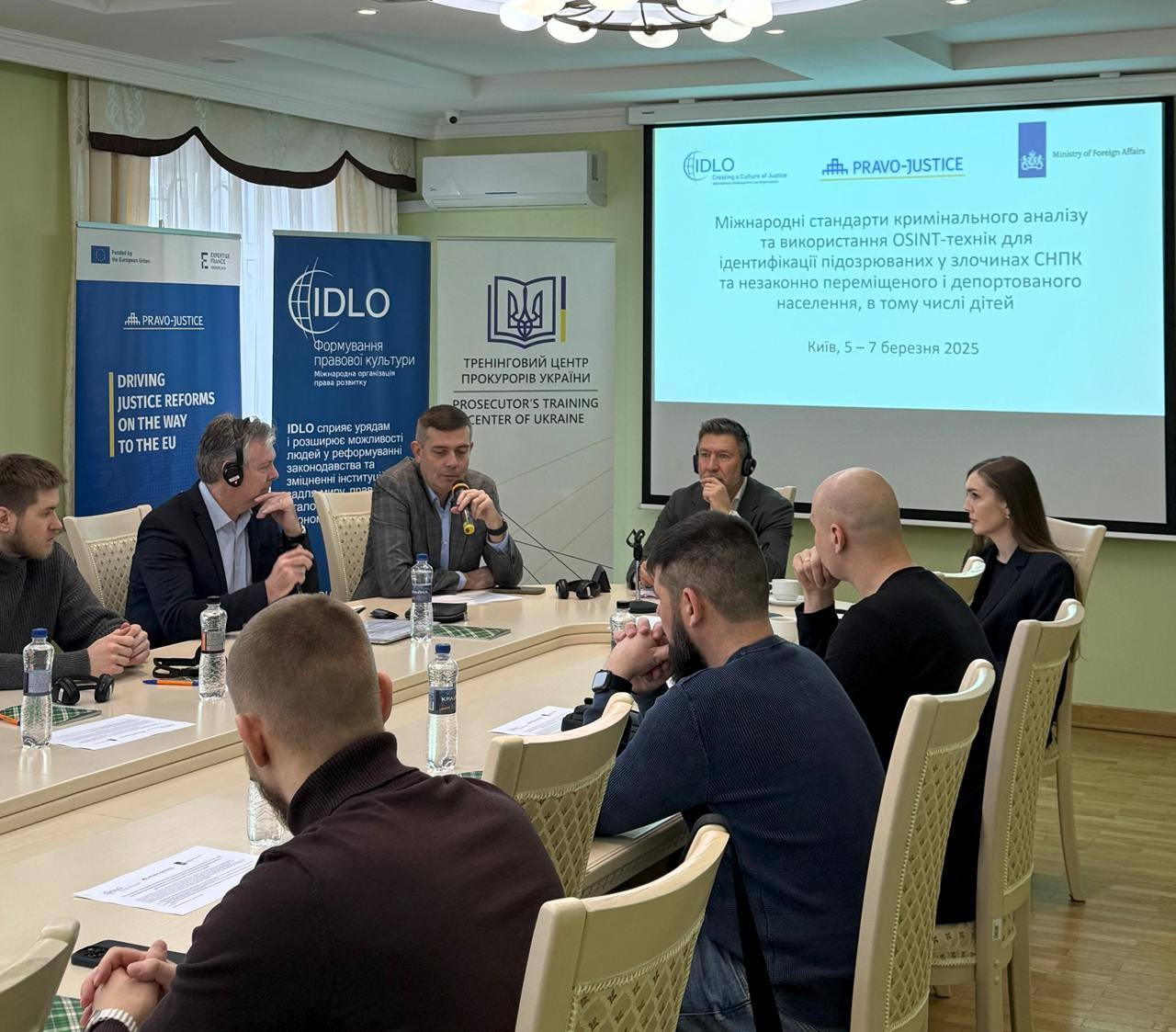Digest of EU Project Pravo-Justice. Issue No. 15 of 25 March

We invite you to check out the digest of EU Project Pravo-Justice covering the top news from 15 February to 23 March 2025.
Support to EU Integration Process in the Justice Sector
- Within the framework of the grant awarded by EU Project Pravo-Justice, a coalition of civil society organisations – Agency for Legislative Initiatives, Transparency International Ukraine, ZMINA. Human Rights Centre, Tomorrow’s Lawyer, Ukrainian Bar Association and European Pravda – has launched a new cycle of monitoring and assessing Ukraine’s progress in the field of European integration under Chapters 23 ‘Justice and Fundamental Rights’ and 24 ‘Justice, Freedom and Security’.
These chapters are part of Cluster 1 ‘Fundamentals’, which is key for the entire negotiation process on Ukraine’s accession to the EU. The results of monitoring and assessing Ukraine’s progress under both chapters will be presented in the 2025 Shadow Report.
“Producing shadow reports is an important tool for countries aspiring to the EU membership, as it is an independent assessment of real progress in fulfilling the membership criteria. This year, we supported the expansion of monitoring to cover not only Chapter 23, but also Chapter 24, which embrace all together the key areas of Cluster 1 ‘Fundamentals of the EU Accession Process’. It is important that the Shadow Report shows not only changes in legislation, but also how they work in practice, and becomes a milestone for further reforms. For EU Project Pravo-Justice, supporting such an initiative is a contribution to strengthening the role of civil society in the European integration process and increasing the effectiveness of reforms,” emphasised Oksana Tsymbrivska, Team Leader of EU Project Pravo-Justice.
- Also, within the framework of the grant awarded by EU Project Pravo-Justice NGO “Interregional Expert Centre Pro Justice” has launched a project aimed at a comprehensive analysis of the application of the Law of Ukraine “On Administrative Procedure” (LAP) and exploring the judicial control in administrative proceedings.
“ The study, which will be conducted by Pro Justice, will allow us to analyse the effectiveness of judicial control in administrative proceedings and strengthen it so that it could be applicable in all categories of cases,” noted Iryna Zharonkina, Enforcement and Protection of Property Rights Component Lead at EU Project Pravo-Justice.

- EU Project Pravo-Justice supported training “Effective Communication as an Integral Part of European Integration” for senior government officials of the Ministry of Justice of Ukraine.
The event aimed to improve their communication skills, in particular when interacting with the media. These skills are particularly important for European integration, as the Ministry of Justice must take efforts to effectively raise public awareness of the progress made, which will contribute to increased public confidence in the reforms being implemented.
Judicial reform
- Within the framework of the grant awarded by EU Project Pravo-Justice NGO Dnistrianskyi Centre is launching the project “Assessing the Functional Effectiveness of Judicial Governance and Self-Governance Bodies”. In particular, while implementing the project, Dnistrianskyi Centre experts will analyse the mandate and functions of judicial governance and self-governance bodies and propose steps towards eliminating overlaps among them, optimising their structure and aligning it with the Constitution of Ukraine, international standards and EU requirements.
“Judicial governance and self-governance bodies are vital for the successful implementation of judicial reform and strengthening the rule of law. That is why EU Project Pravo-Justice supports the initiative of the Dnistrianskyi Centre, which offers analytical expertise, practical recommendations and a solid focus on European standards. This comprehensive approach drawing on the involvement of independent experts will contribute not only to the strategic development of the judiciary, but also to progress on the path of European integration for Ukraine, particularly under Chapter 23,” emphasised Olha Sribniak, Deputy Team Leader of EU Project Pravo-Justice.
Prosecutorial Reform and Prosecution for International Crimes

- On 5-7 March, a hackathon on using open source intelligence (OSINT) methods for investigating war crimes in Ukraine was held on the initiative of EU Project Pravo-Justice and the International Development Law Organisation (IDLO).
Over the three-day intensive course, prosecutors, investigators, analysts and experts contributed to developing innovative solutions for identifying suspects and collecting evidence in cases concerning the unlawful deportation of children, conflict-related sexual violence and other war crimes.
“The hackathon has become an excellent platform for successful cooperation between international and national experts on effective investigations of war crimes. The intensive course demonstrated that joint efforts are key to ensuring accountability and restoring justice. The participants had an opportunity to deepen their knowledge on using OSINT techniques in war crimes proceedings,” said Anna Stakhanova, Key Expert on Fight against International Crimes of EU Project Pravo-Justice.
Enforcement and Protection of Property Rights
- EU Project Pravo-Justice supported the launch of training course for Ukrainian judicial experts “Towards the Establishment of a Professional Association”.
The course aims to help judicial experts learn about the experience of professional self-governing expert associations in EU Member States, capacity building for professional associations and their role in governing judicial experts’ activities. The course attendees will also analyse the legal and regulatory framework for professional associations in EU Member States, their articles of incorporation and internal regulatory framework.
The course curriculum was developed in cooperation with international experts, particularly the Polish Institute of Internal Affairs – EFIC. The training sessions will be delivered by representatives of EuroExpert, the Organisation for European Expert Associations, and representatives of self-governing professional associations from Austria, Belgium, France and Germany.
Penitentiary System Reform
- EU Project Pravo-Justice initiated training for HR staff of the Probation Centre on methods for assessing the competencies of candidates and personnel working in Probation departments. The training was delivered by Project experts Serhii Syniohub and David Knott.
They shared effective assessment methodologies, particularly online testing and interviewing.
- Also, on the initiative and with the expert support of EU Project Pravo-Justice, the trainings for probation mentors on the development and implementation of training programmes for adults were held. The training course was attended by 19 mentor-trainers from the State Institution “Probation Centre”, who would subsequently conduct trainings for probation officers on various professional topics.
“Mentoring in probation is not just a transfer of knowledge, but a complex process of support, motivation and development of those who constantly work with probation clients. To work effectively in this field, mentors shall constantly improve their professional competencies. That is why experts of EU Project Pravo-Justice have developed a new training course that would allow probation mentors to “level up” one of the key skills –training ability, namely, ability to structure information and effectively convey it to colleagues,” said Olena Kochura, Key Expert on Penitentiary Reform and Probation of EU Project Pravo-Justice.
- On February 20, the Plan for Strengthening the Capacity of the Ministry of Justice of Ukraine for the resocialisation of convicts was presented. It has been developed by experts from the Netherlands Helsinki Committee, EU Project Pravo-Justice, and representatives of MoJ Department for the Execution of Criminal Sentences, Western Interregional Directorate and penitentiary institutions, as well as the State Penitentiary Academy.
The presented Plan provides for three benchmarks for further development of the resocialisation system – security, transparency and innovation.
- On March 17, attendees of the training course “Motivational Interviewing. Changing the Behaviour of Probationers” organised on the initiative and with the expert support of EU Project Pravo-Justice took final tests. As a result, 20 out of 21 participants have successfully completed the training.
“The training of the second group of trainers in motivational interviewing has been completed. On March 26-27, they will take additional training in basic coaching skills. After that, they will be able to conduct trainings for all probation officers,” said Olena Kochura, Key Expert on Reforming the Penitentiary System and Probation at EU Project Pravo-Justice.